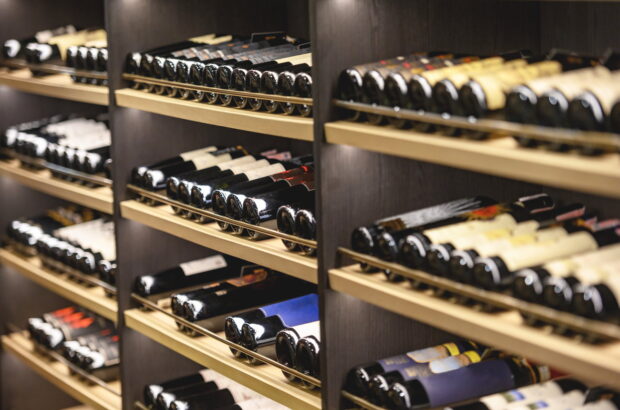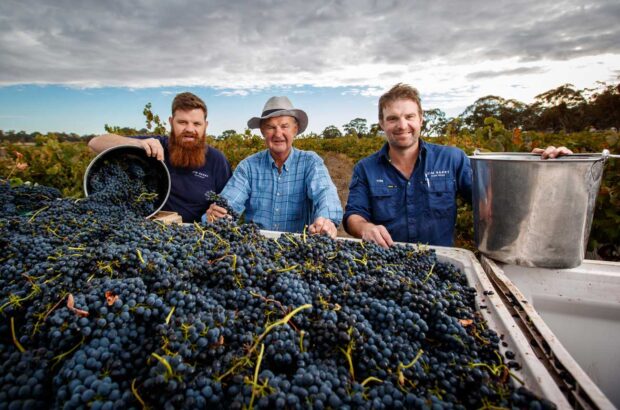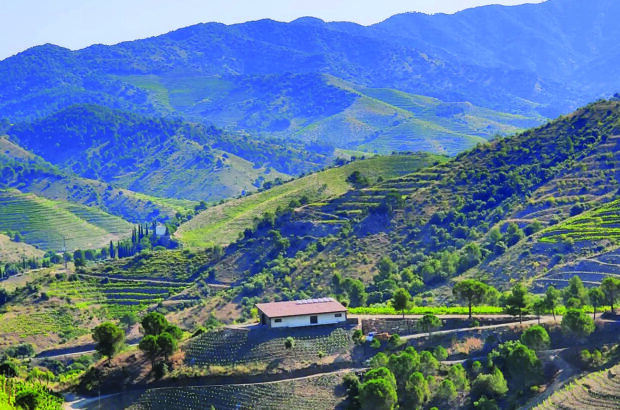This month, world leaders are gathering in Glasgow for COP26 – a conference described by Sir David Attenborough as possibly ‘our last opportunity’ to make the necessary step-change towards protecting the planet from a ‘crippling’ climate crisis.
Wine will not top the list of global concerns at COP26. Its carbon footprint is modest compared to domestic heating or aviation. But the glass of wine in our hands still contributes significantly to environmental damage and global warming, by degrading soils, reducing biodiversity, contaminating groundwater, releasing CO2 during fermentation, and in its packaging and transport.
Efforts are being made to respond. The Porto Summit in 2019 called for action. Many wine producers, notably Torres in Spain and Jackson Family Wines in California, are adopting less carbon-intensive approaches. However, as Santiago Navarro of Garçon Wines puts it: ‘The talk is nowhere near the action required.’ And wine consumers are changing their habits too slowly.

Garçon Wines’ Eco Flat bottle is made from recycled PET
Clear message
Ed Robinson, wine buyer for UK supermarket Co-op, says ‘people’s attention is shifting to what’s in the bottle and how it’s made’. The pandemic, it is said, has made us more aware of the fragility of our planet. In a 2020 global survey by Getty Images, 81% of consumers saw themselves as ‘eco-friendly’. However, just 50% said they actually purchased only ‘brands that try to be eco-friendly’.
Richard Bampfield MW believes that ‘if sustainability was properly communicated, consumers would be willing to pay more’ for sustainably produced wines. Laws and certification schemes on sustainability vary by country, even region; and few producers show their wines’ carbon footprint. ‘There are so many different symbols and logos on labels,’ says Maiju Sirviö, sustainable development specialist at Finland’s state alcohol monopoly Alko. ‘It’s really hard for consumers to know what to do.’
Bampfield is working with Toby Webb of Innovation Forum through the new Sustainable Wine Roundtable to build a common vision of sustainability and create a global standard. ‘The younger generation care about provenance and are ready to ask awkward questions,’ says Bampfield. ‘We may soon reach a point where producers will not be able to sell wines unless they can show they are sustainably produced.’ US publication Wine Advocate now has a ‘Robert Parker Green Emblem’ to ‘empower wine lovers who want to drink more sustainably’ by identifying wines produced by ‘outstanding proponents of sustainability’.
Glass to go?
While the focus has been on making wine more sustainably in the vineyard and winery, the ‘elephant in the room’ is packaging – and specifically glass bottles. Glass is inert, durable and well-suited to ageing wine. But it is energy-intensive to make, and traditional round bottles are an inefficient shape and weight to transport and store. ‘If we were starting from scratch, no one would come up with a round glass bottle for wine’, says Navarro.
As well as being very carbon-intensive, recycling glass is complicated and patchy. According to Charles Bieler, co-founder of US venture Gotham Project, ‘only 30% of glass is recycled in the US and 10% of US landfill by weight is glass’. In 2018, about 68% of UK bottles were recycled (British Glass/FEVE), compared to a total EU28 figure of 76%, and 90% or more in Switzerland and most of Scandinavia.

Bruce Schneider and Charles Bieler of the Gotham Project
Ten years ago, California’s Wine Institute commissioned a study that showed more than half its carbon footprint came from packaging and transport (see chart below). Research in Australia estimated that using and recycling glass bottles accounts for 68% of its wine industry’s carbon emissions. ‘Sustainable practices in viticulture are important’, says Bieler, ‘but they are only part of the picture. We can make more of a difference by changing how we package and transport wine.’
More than 30 billion bottles of wine are produced every year, according to OIV (International Organisation of Vine and Wine). Trade estimates say the vast majority, about 90%, are consumed within weeks of purchase, with only a small percentage bought for ageing.
The only reason for bottling drink-now wines in glass is to fulfil consumers’ expectations of how wine should be presented. It is cheaper and more sustainable to ship wine in bulk and package locally in easy-to-recycle formats.
Navarro believes, ‘above all, it’s the big wine companies who need to change their practices – including those who hold conferences on sustainability and then ship their wines around the world in glass’. Bieler feels that ‘we need to get more commitment from retailers to change’.

Scaling up
Trade figures show that some 40%-45% of UK wine imports arrive in bulk today, but in the past this was much more common before bottling at source became the norm. Gotham Project is something of an exception in importing wine to the US in ‘flexitanks’, which are then siphoned into kegs and bottles for sale all over the country.
A growing amount of high-quality wine is now available in non-glass packaging, including bag-in-box (BIB), pouches and tubes, aluminium cans, paper-based Tetra Pak and plastic bottles made from polyethylene terephthalate (PET), some more easily recyclable than others. ‘BIB wine and cans offer customers an opportunity to enjoy wine in a more sustainable way,’ says Marien Rodriguez of UK supermarket Waitrose. ‘Customers understand these wines can be of high quality and environmentally responsible.’
Garçon Wines’ Eco Flat bottles made of recycled PET are cleverly designed, have a far lower carbon footprint than glass bottles and are easier to transport and stack. Ed Robinson says the Co-op’s new range of Banrock Station wines in flat PET bottles is creating lots of interest.
For the more traditional, Nomen in Oregon sells its wines in PET bottles that look identical to classic bottles. Alko’s Sirviö comments: ‘PET bottles may be the biggest growth area for wines. Finnish consumers aren’t bothered by plastic packaging because they are confident it will be efficiently recycled. And much less energy is required than for recycling glass.’
Making a 147-year-old business zero carbon
Britain’s venerable Wine Society, now building up to its 150th anniversary in 2024, aims to be carbon neutral by 2028 and zero carbon by 2040.
In addition to some ‘tactical’ changes such as installing solar panels on its warehouses, it has just released a new sustainability strategy.
It plans to share environmental best practice among its producers, help Society members understand the environmental impact of its wines, reduce all packaging to the minimum and commit to ensuring all packaging is easily recyclable. According to head of buying Pierre Mansour, it is also considering introducing a scorecard for the carbon footprint of each wine it sells.
‘Having a proper sustainability strategy is a bit like the new internet: it will make or break businesses of the future,’ says Mansour. ‘If we want future generations in 50 years’ time to be able to enjoy superb, characterful wines that reflect where they are made, we have to invest to protect fine wine terroirs today.’
Can do better
The popularity of canned wines, once a quirky novelty, is ‘exploding’ in the US, according to Bieler, in part because of their convenience for picnics, barbecues and other outdoor activities. Cans are cheaper to produce and transport than glass and can be recycled almost endlessly. ‘The best wines I’ve tasted from cans have been of a quality I’d be happy to take to the dinner table,’ says wine critic Jancis Robinson MW. Pierre Mansour of The Wine Society says he is ‘impressed by the quality of wine in cans compared to the same wine in bottles’. Canned wine brands such as The Copper Crew and CanCan, both from South Africa, have been widely praised.
‘We are all responsible for the impression that good wine comes in bottles,’ acknowledges Jancis Robinson. ‘We must do more to send the message that wines in alternative packaging can be cool, too.’ Bieler, who has been selling wine for years in Tetra Pak, agrees: ‘We need to chip away at the idea that quality wine has to come in glass bottles. You can put shitty wine in glass and it will still be shitty; you can put great wine in Tetra and it will still be great.’
Consumers may take some convincing, though. ‘Wine is a romantic product. The packaging, the pop of the cork, hasn’t changed for centuries,’ says Ed Robinson. ‘So wine in cans or flat, recycled plastic bottles is a major disruption.’ Many wine lovers will continue to expect wine in glass bottles. And glass is, for the time being, the only practical material for wines that need ageing. So a key challenge is to use it more sustainably.
Refilling bottles at cooperatives and ordering restaurant wine in carafes were once common. Gotham Project’s Bieler, and Muriel Chatel of Borough Wines (see box below), are among a small but determined band trying to make it easier for drinkers to return bottles for reuse, to avoid the need for recycling. It’s a multi-faceted challenge that involves creating transport infrastructure, investing in bottle-cleaning plants, using easily removable labels and – perhaps above all – changing our habits. Bieler says he is ‘determined to fight like hell’ to make his Return & Reuse scheme work across the US.
Damien Barton of the illustrious Bordeaux wine family is another entrepreneur who wants ‘to prove you can change things for the better at the same time as making money’. In addition to running St-Julien third growth Château Langoa Barton and 225, a brand of sustainable Bordeaux wines shipped in bulk for UK bottling, he works with Borough Wines’ returnable bottle scheme for some Barton wines, including the second wine of Moulis en Médoc estate Château Mauvesin Barton. ‘It took a bit of thought to organise,’ he admits, ‘but if Coca-Cola can do it, so can we.’

Muriel Chatel, Borough Wines
Zero waste, zero packaging, zero emissions
After starting out selling French wine from a stall in London’s Borough Market 20 years ago, Muriel Chatel of Borough Wines developed a ‘zero waste’ approach by offering wines from all over the world on tap in reusable kegs and piloting bottle return, working with Damien Barton in Bordeaux.
‘We don’t want to preach to consumers,’ she says. ‘We just want to show that there is another way of doing business that is transparent, profitable and sustainable.’
Through its Sustainable Wine Solutions business, the company delivers bottles and kegs with zero packaging to the wine trade around the UK, using electric vans in London and picking up empties, which are steam-cleaned at high temperature for reuse. ‘The world is ready for change,’ says Chatel.
‘Consumers really care about sustainability, but recycling is hard. Sustainability can be convenient without being more expensive.’
Chatel plans to expand her range to 100 wines in the coming year, along with bottle return schemes in other parts of the UK, including Manchester and Scotland.
Responsible choice
Perhaps the easiest win is to reduce glass bottle weight. Consumers are thought to associate heavier bottles with quality, but unlike sparkling wine, which must withstand high pressure, still wine can be transported in lightweight glass. Plenty of first-rate producers, such as Verget in Burgundy or Felton Road in New Zealand, produce great wine in light bottles. ‘Heavy bottles are ridiculous’, says Barton, who has reduced bottle weights at Châteaux Léoville and Langoa Barton. ‘Maybe retailers should refuse to list wine in heavy bottles,’ suggests Jancis Robinson. Ed Robinson agrees: ‘If consumers began boycotting absurdly heavy bottles, it would be a good start.’
In Finland, Alko is an example of what is possible. Every producer that supplies Alko has to sign an agreement on ethical principles. ‘Green Choice’ symbols indicate that the wine is either biodynamic, carbon neutral, natural wine, organic, sustainable, vegan and/or packaged responsibly. Glass is still widely used, but alternative forms of packaging are gaining ground and, crucially, Finland has an efficient recycling system. Alko publishes its total carbon footprint statistics every year.
Creative, forward-thinking outlets such as Gotham Project, Borough Wines and Alko show that wine can be sourced and distributed more sustainably. But these are small steps in a race for time. The threat from climate change and environmental degradation is a global emergency, and our overall pattern of wine consumption remains unsustainable.
We wine drinkers, along with everyone else in the supply chain – producers, distributors and retailers – have a role to play. ‘Even if you drink only fine wine, you should care about how mass market wine is packaged,’ says Navarro. ‘If you don’t, climate change risks making it impossible for producers of fine wine to survive in their current regions.’ As Barton puts it: ‘If everyone does a little it, it can make a big difference.’
10 practical ways you can help
As The Wine Society’s Pierre Mansour puts it, ‘wine drinkers need to understand the consequences of their choices’. Here are 10 ways you can purchase wine more sustainably and help to influence positive change in production, packaging and transport practices:
- Think about the provenance, packaging, transport and life cycle of every wine you buy.
- Do your research and buy from producers committed to minimising their environmental impact. Many are signed up to sustainability schemes and use logos on their labels.
- Favour wine merchants and supermarkets that work with sustainable producers.
- For immediate drinking, buy wines in alternative packaging such as aluminium cans and PET bottles that are less carbon-intensive than glass to recycle.
- If you are buying still wines to keep for more than a year before drinking, shun producers who use heavy glass bottles.
- Seek out bottle refill schemes and encourage the retailers you use to introduce them.
- Look for restaurants, wine bars and pubs that serve wine on tap from reusable kegs.
- Bear in mind that wines shipped in bulk and bottled locally are less carbon-intensive.
- Drink local where you can. If a wine has come halfway across the world in a glass bottle, it will probably have a disproportionately heavy carbon footprint.
- Use your influence as a consumer. Ask your wine merchants and supermarkets what steps they take to ensure their wines are sustainably produced, packaged and transported.












